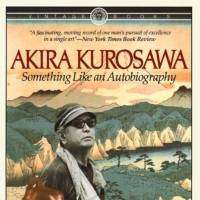We sometimes forget that the great film director, Akira Kurosawa, was also an accomplished scriptwriter. In this, his wonderfully digressive autobiography, he rightly eschews the trivia of opening nights or the demands of leading ladies, to focus on the art of filmmaking, the role of director, the use of multiple cameras in a single shot, the process of editing and the importance of immersing oneself in good literature.
Akira Kurosawa: Something Like An Autobiography, by Akira Kurosawa
205 pages
vintage, Nonfiction.
Born in 1910, Kurosawa lived through periods of unimaginable change. As a schoolboy he witnessed the Great Kanto Earthquake in 1923, and its effect on human behavior. On the massacre of Korean residents of Tokyo after the quake, he writes that it was, "brought on by demagogues who deftly exploited people's fear of the darkness." In an old garment district near the Sumida River, he comes across a landscape remodeled with mounds of corpses: "On top of one of these mountains," he writes, "sat a blackened body in the lotus position of Zen meditation."
The constrictions of working during the war are treated with the contempt of someone who is not permitted to do the work he was destined for. After the shelving of a serious project at the start of the conflict, he confesses to giving up fighting to be a real director, succumbing instead to writing scripts "in order to earn the money to drink, and I drank as if it were going out of style."
Like the best autobiographies, Kurosawa writes not simply about himself, but the times in which he lived.



















With your current subscription plan you can comment on stories. However, before writing your first comment, please create a display name in the Profile section of your subscriber account page.